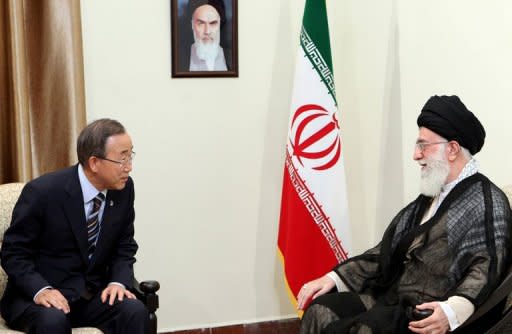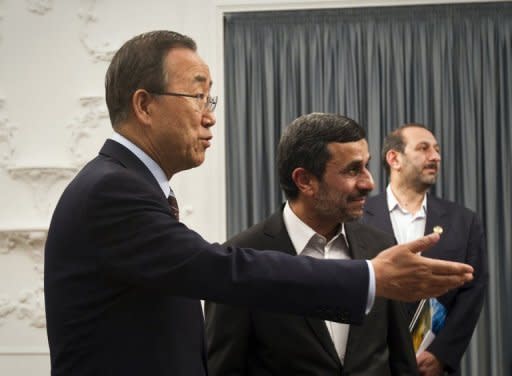UN, Iran leaders duel over nuclear issue
UN chief Ban Ki-moon and Iran's supreme leader, Ayatollah Ali Khamenei, sparred in an unusually frank verbal duel on Wednesday over Tehran's disputed nuclear programme, betraying high tensions on the issue. Ban told Khamenei and, separately, President Mahmoud Ahmadinejad to take "concrete" steps to fix the worsening international showdown over their atomic activities, according to his spokesman. But Khamenei, according to his official website, shot back by saying the "defective" United Nations was in thrall to the United States, and accusing the UN nuclear watchdog of "sabotaging" Iran's nuclear progress. The tough-talking exchange came on the eve of a two-day summit in Tehran of the Non-Aligned Movement, at which Ban is a star guest. Iran's leaders had portrayed the event as proof that they were not as isolated as the West was saying. Ban's comments upheld his promise to raise the issues of the nuclear standoff, human rights and the conflict in Syria with Iran's leaders during his Tehran visit. The UN leader called for "concrete steps to address the concerns of the International Atomic Energy Agency and to prove to the world that its nuclear programme is for peaceful purposes," his spokesman, Martin Nesirky, told reporters. Ban "regretted" that little progress was made in several rounds of negotiations this year between Iran and the P5+1 comprising the five permanent UN Security Council members plus Germany. But he also condemned warnings from the United States and Israel of possible military strikes on Iranian nuclear facilities. Khamenei's official website noted the "concern" expressed by Ban over the nuclear issue and the UN chief's call for Iran "to show more cooperation with the IAEA and P5+1 group." The supreme leader was also quoted shooting back that the United Nations should make a greater effort to rid the Middle East of nuclear arms, stressing Israel's status as the region's sole if undeclared nuclear weapons state. He also said that "unfortunately, the structure of the UN is a defective one with the biggest bully of all the nations, which has used nuclear weapons (the United States), dominating the Security Council." "The United States knows we are not seeking nuclear weapons and it is only looking for excuses," he said. Khamenei also said the IAEA "is obliged to give us technical and scientific aid, but not only has it not done so, it has always sabotaged" Iran's drive to develop nuclear energy. He criticised the UN nuclear watchdog for not condemning the United States for reportedly admitting to using computer viruses to slow Iran's uranium enrichment activities. Khamenei reiterated that his country viewed nuclear weapons as against its Islamic beliefs. The supreme leader was due on Thursday to address the NAM summit, which was likely to endorse the right of peaceful nuclear energy for all, subject to IAEA supervision. Ban's attendance at the summit had been criticised by the United States and Israel, which have taken the lead in pressuring arch-foe Iran on its nuclear programme. Israeli Prime Minister Benjamin Netanyahu on Wednesday renewed his charge against the summit, calling it "a disgrace and a stain on humanity" given Iran's frequent diatribes against his country, denying its right to exist. But Ban in his meeting with Khamenei took Iran's leaders to task over their recent descriptions of Israel as a "cancerous tumour" that should be excised and Ahmadinejad's Holocaust-denying remarks. He told Khamenei he "strongly objected" to those words, and said "such offensive and inflammatory statements were unacceptable and should be condemned by all," his spokesman said. The two also discussed the role Iran could play in quelling the violence raging in Syria, whose regime it staunchly supports. Khamenei repeated his stance that "the bitter reality is that some countries are using the opposition groups in Syria as proxies to wage war against the Syrian government."



